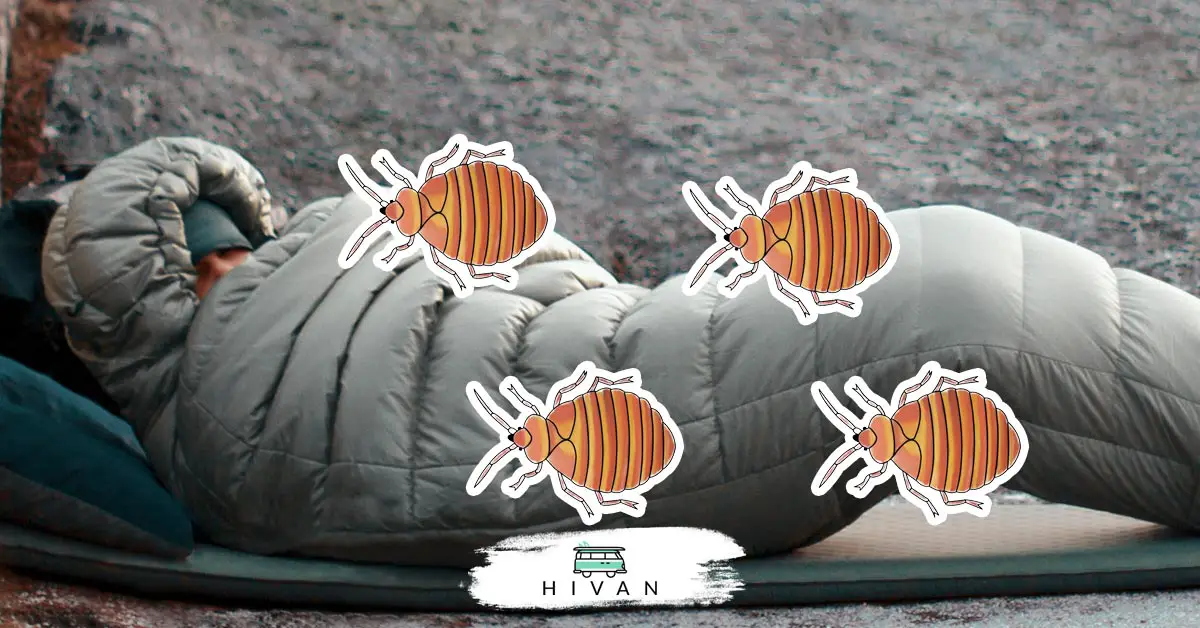Hi-van is supported by its audience. When you purchase using our links, we may earn an affiliate commission (no added cost to you). Learn more
Bed bugs are often thought of as a residential neighborhood issue. Unclean bed sheets, dirty laundry, and old fabrics are the leading causes of bed bugs, so many people wonder if they’re an issue for campers. Contrary to popular belief, there are many reasons why bed bugs can become a nuisance outdoors.

Bed bugs can get into sleeping bags while camping because they enjoy breeding on fabric and anywhere people go. They’re much more likely to become an issue on natural materials, such as cotton. However, synthetic sleeping bags can still have bed bugs, especially if they have cotton filling.
In this article, we’ll discuss how bed bugs attack sleeping bags, what you can do to prevent it from happening, and whether or not it can happen to synthetic materials. We’ll also show you how you can stop them from coming home on your camping equipment.
Do Sleeping Bags Prevent Bed Bugs?
Sleeping bags don’t prevent bed bugs because they’re naturally attracted to warmth, fabric, and animals. All three of these factors are found when you’re sleeping in a sleeping bag, making it the perfect environment for all sorts of bed bugs. You can use a silk liner to prevent bed bugs from biting you, though.
Sleeping bags haven’t been designed with bugs in mind since it’s very difficult to control the insects when you’re sleeping outside. There’s not much manufacturers can do aside from adding dangerous chemicals to the fabrics, which could lead to a much bigger problem.
How Do I Keep Bed Bugs Out of My Sleeping Bag?
To keep bed bugs out of your sleeping bag, follow this process:
- Get a silk liner to put inside of your sleeping bag since bed bugs dislike them. According to The Hiking Authority, silk liners prevent bed bugs because the insects can’t get through the fabric. While they’re an effective measure, you need to follow them up with the remaining four steps.
- Never place your sleeping bag on the dirt, and make sure you don’t drag any debris into your tent or motorhome. Bed bugs are most likely going to find a way into your sleeping bag and other camping gear if they’re left outside. These bugs can easily crawl into your sleeping setup if it’s low enough.
- Use lemongrass oil, tea tree oil, peppermint oil, or lavender oil to repel bed bugs and keep your sleeping bag smelling fresh. HuffPost explains these essential oils (among a few others) are great for treating and preventing bed bugs. The scents repel them by causing eye irritation and strong odors.
- Let your camping gear aerate when you’re not using it (including your backpack, tent, sleeping bag, pillow, and so on). Bed bugs won’t stay in your sleeping bag for too long if they don’t have an enclosed space. Aerating your gear also prevents sweat from building up, which could otherwise attract bed bugs, spiders, and mosquitoes.
- Seal your tent or door as much as possible. Your tent, motorhome, or van should be closed to prevent bugs and debris from getting inside. These issues can invite bed bugs, letting them make a home out of your sleeping bag, towels, backpacks, and other equipment found inside.
As you can see, there are many effective ways to prevent bed bugs from becoming a serious problem when you’re camping. Natural repellents are incredibly useful, but nothing beats keeping your items clean and sealed. If there’s no way for the bed bugs to get into your sleeping bag, you won’t have to stress about cleaning them out.
How Do You Not Bring Bed Bugs Home from Camping?
If you don’t want to bring bed bugs home from camping, wash your gear right when you get home. It’s important to use high-heat settings as much as possible to eliminate the bugs. If the fabric doesn’t let you wash and dry it on high-heat modes, wrap it in an airtight trash bag and leave it in the garage for a week.
Try these tips to not bring bed bugs home in your sleeping bag:
- Wash all of your camping gear right when you get home instead of placing them in a storage area. Bed bugs can survive and thrive for quite some time, so it’s not worth risking it. Toss everything in the laundry machine, ensuring you follow each item’s instructions to prevent them from overheating.
- Seal your sleeping back, camping clothes, and pillows in a black plastic trash bag. City Pests shows you can seal your fabrics in a plastic garbage bag to eliminate the bed bugs and other insects. This technique works so well because it deprives them of oxygen, preventing them from spreading.
- Store all of your sleeping gear for camping in an airtight tub until you head out on your next camping trip. Even though the plastic bag trick is useful, it doesn’t stop other bed bugs from showing up during long-term storage. Get a couple of large plastic tubs with lids to keep your camping gear in good condition.
- Use natural essential oil fabric spray before and after storing your sleeping gear for long periods of time. Essential oils not only prevent bed bugs from coming back, but they also stop a host of other bugs. Grab your favorite scented solution and enjoy fresh scents and no bed bugs when it’s time to go camping again.
This handful of suggestions can make a significant difference in how often you have to deal with bed bugs and other insects while camping. If you follow all of them (as well as the five-step process in the previous section), you shouldn’t have to worry about bites, stings, and so on.
Conclusion
Now that you know how to prevent bed bugs from coming home with you on your next camping trip, you can keep the insect outdoors. Camping should be a fun experience, so there’s no reason to have to deal with bug bites, itchiness, redness, and other symptoms of bed bugs. Remember to wash your camping gear as soon as you get home. Good luck!
Find this content useful 🙂 ?
Subscribe to our Newsletter and get a free Solar Electric Diagram + shopping list.

